Skræmmer tanken om at rejse med SIBO dig? Er du bekymret for, at du aldrig vil være i stand til at forlade hjemmet igen?
Den gode nyhed er, at det at have SIBO ikke betyder, at du behøver at være eremit. Jeg er en ivrig rejsende, der har besøgt mange lande siden min SIBO-diagnose. Og jeg er her for at fortælle dig, at det ER muligt at rejse med SIBO.
I den seneste måned har jeg rejst til og fra USA to gange. Det er 4 langdistanceflyvninger plus kortere indenrigsflyvninger. Jeg har samlet mine og The Healthy Gut-fællesskabets bedste tips til, hvordan du flyver internationalt med SIBO for dig.
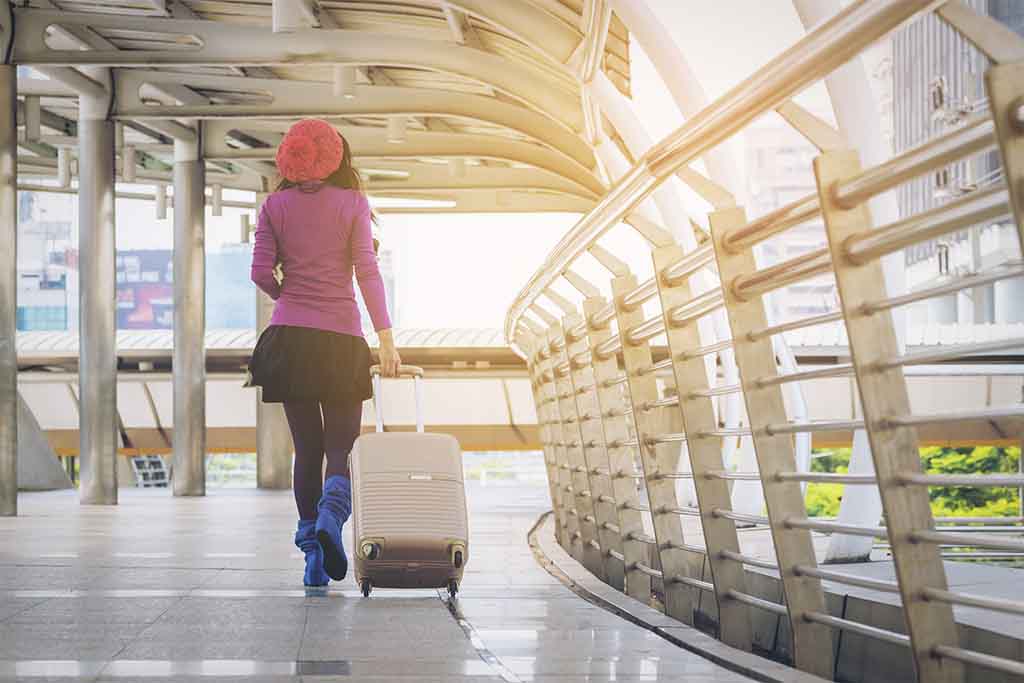
Hvis du skal investere i en international rejse, skal du ikke spare på flyrejsen. Den oplevelse, du har med et flyselskab, kan gøre starten og slutningen af din rejse fantastisk eller forfærdelig. Du vil gerne nyde dit fly, og det flyselskab, du vælger, kan spille en stor rolle i at gøre det muligt.
Overvej, hvad der er vigtigt for dig:

Den hastighed, som du kan nå din destination



































Antallet af forbindelser, du skal foretage eller et direkte direkte fly



































Bekvemmeligheder på flyvningen



































Måltidsmuligheder



































Sædestigning og -bredde



































Opgraderingsmuligheder
Når jeg rejser længere end et par timer, sætter jeg altid min komfort som en topprioritet. Jeg vælger flyselskaber, der tillader opgraderinger til en mere premium-kabine og tilbyder en god service under flyvningen. Jeg flyver Virgin Australia til og fra USA, fordi du kan afgive bud på Premium Economy og Business kahytterne. Jeg køber et Economy-sæde og byder så det lavest mulige beløb for en opgradering. Hvis jeg ikke får det, har jeg ikke betalt noget, så det er en god mulighed. Jeg er kun gået glip af en opgradering én gang og har været så heldig at blive opgraderet til Business på flere rejser.
Jeg har også fløjet Air New Zealand til USA på adskillige rejser, og deres Premium Economy og Business kahytter er fantastiske, plus deres service er fremragende, selvom de ikke tilbyder budmuligheden som Virgin Australia gør, men har ofte et godt salg, så du kan hente en billetpris for en god pris.
Selvfølgelig, hvis du har råd til at købe et premium-sæde, så gør det! Det gør det så meget sjovere at flyve.
Jeg har tidligere fløjet billigere flyselskaber internationalt, men er ankommet udmattet efter at have været proppet som en sardin i timevis og blev endda udsat for seksuelle overgreb på en flyvning med Royal Brunei Airlines (London til Melbourne), hvor personalet og flyselskabet ikke gjorde noget ved det. . Jeg havde købt det fly, fordi det var så billigt; det virkede for godt til at være sandt. Det var, og jeg vil aldrig gå efter det billigste flyselskab igen.
"Rejser er en vidunderlig oplevelse. Lad ikke SIBO forhindre dig i at gøre de ting, du elsker."
Rebecca Coomes
Jeg flyver altid med flyselskaber på langdistanceflyvninger, der giver mig mulighed for at vælge mit sæde på forhånd. Når du har SIBO, har du nok angst for at komme på toilettet. Du behøver ikke at bekymre dig om ikke at have et behageligt sæde.
På langdistanceflyvninger er jeg altid vælg et gangsæde, så jeg nemt kan komme op på toilettet og ikke skal klatre over fremmede eller genere nogen ved mine konstante toiletbesøg.
Hvis du tager en natflyvning, kan du godt lide et vinduessæde, så du kan hvile dig mod flyet, mens du sover. Personligt bliver jeg for ængstelig ved tanken om ikke at kunne gå på toilettet, så jeg vil altid foretrække et gangsæde frem for et vinduessæde.
Vil du se, hvad de bedste sæder er på dit fly? Tjek Seat Guru ud hvor du kan indtaste dit flyselskab og flynummer, og de vil vise dig, hvad de bedste og værste sæder er på flyet.
Ligesom dit sædevalg er vigtigt for at reducere din toiletangst på flyrejsen, er det også vigtigt at vælge at flyve med et flyselskab, der tilbyder en bred vifte af måltider under flyvningen.
Rul ned for at se mine tanker om at spise på et fly, men jeg synes, det er vigtigt at have et måltid tilgængeligt for dig, selvom du ikke ender med at spise det.
Når du flyver Economy, vil du modtage en standard måltid (ingen prangende menuer her) og vil generelt få 2-3 muligheder. Du kan dog indsende en speciel måltidsanmodning i forvejen. De fleste flyselskaber kræver 48 timers varsel, men tjek med dit flyselskab, så du ikke går glip af at få et passende måltid.
Vælg den type mad, der er mest generende for dig. For mig er det gluten. Selvom der i øjeblikket ikke er et Low FODMAP-måltid tilgængeligt hos flyselskaber, kan du vælge mellem en række måltider, herunder:



































Gluten free



































Lactose free



































Bland meal (no onion, garlic, spices, strong seasonings)



































Vegetarian and vegan
Sadly, you can't combine 2 or 3 meal types. For instance, you can't request a meal that's gluten and lactose-free and bland, which is what most SIBOers will need.
When flying in Premium Economy, Business or First, you will be presented with a lot more meal options. I have found that I can pick regular meals off the menu, rather than having to pre-order a special meal, because there's always a gluten free option.
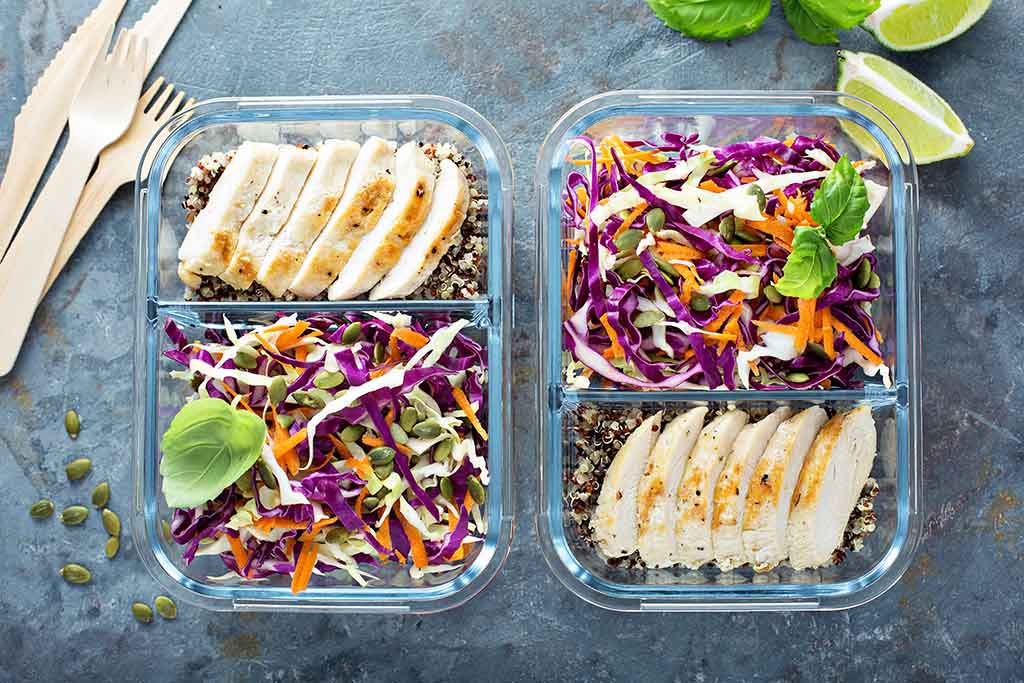

There are fluid restrictions on long-haul flights (maximum of 100ml per container) but there aren't currently food restrictions. However, it's always advisable to contact your airline to double check if you have any doubts.
If you want to eat on your flight, you might prefer to bring your own food and snacks for the flight. You can purchase an insulated bag with ice pack inserts (like this one ). Some great meal and snack options include:



































Grilled chicken pieces



































Slices of cooked beef or lamb



































Tins of tuna or sardines (your neighbours might not love you for this though)



































Salad or cooked vegetables



































100ml container of salad dressing



































Veggie sticks with a small container of chunky roasted pumpkin and macadamia dip



































Pieces of fruit



































Nuts and seeds



































Nut butters in individual portions



































Jerky



































Individual portions of cheese (if tolerated)



































SIBO friendly crackers



































Potato or vegetable chips cooked in suitable oil and seasoned with salt



































A container of my Prosciutto, Egg and Capsicum Muffins or Blueberry Muffins



































Chocolate bark , flavoured chocolates or choc chip granola bars for a sweet treat



































The Elemental Diet - I use the Integrative Therapeutics Physicians Formula (bring the powder and a shaker. You can ask for ice and water to make it into a drink)
You won't be able to take your food into your arrival destination so don't go crazy - just bring as much as you think you can eat so you don't have to throw a lot of food out at the end of the flight.
In case the security screening confiscates your ice packs, always pack a leak-proof zip lock bag says Monica Hardy from our SIBO Bi Phasic Diet Facebook Group . She asks the flight attendants to fill it with ice once she gets on the plane so she can still keep her food cool.
You don't have to eat on a long-haul flight. Instead, you may choose to use the time to fast and just sip water or herbal teas.
Personally, I find having an empty stomach easier on my body than having it full of food. I always bloat on flights, no matter what I do, so the more I avoid food, the easier it is on my system.
I do find that I get very hungry on long-haul flights, so even if you decide to fast, I would recommend you have a back up in case you change your mind. When everyone else is brought their food and the cabin is full of food smells, it can be very difficult to maintain your resolve to keep fasting.
Because I always bloat on long-haul flights, I always wear loose fitting clothes with stretchy waistbands that will allow my belly to grow over the course of the flight. There is nothing worse than being stuck in tight-fitting clothes, in pain from the bloating, and not able to do anything about it.
I also like to layer my clothes. This helps hide the bloating. I take a long scarf, a long cardigan and a jacket. That way I can layer up if I get cold or strip down to a lighter top if the plane is hot. Most of the trips I've done recently are freezing cold, so I'm always glad I've got multiple layers.
I also spray my scarf with perfume or essential oils so that if there are smells on the plane that I don't like, I can bury my nose in my scarf and avoid them.
Finally, pack a spare pair of underwear and clothes. I always plan for the unexpected. If you have an upset tummy and have an accident, you can feel better knowing you can change your clothes. Or, if your luggage goes missing, you at least have one outfit and new underwear to wear.
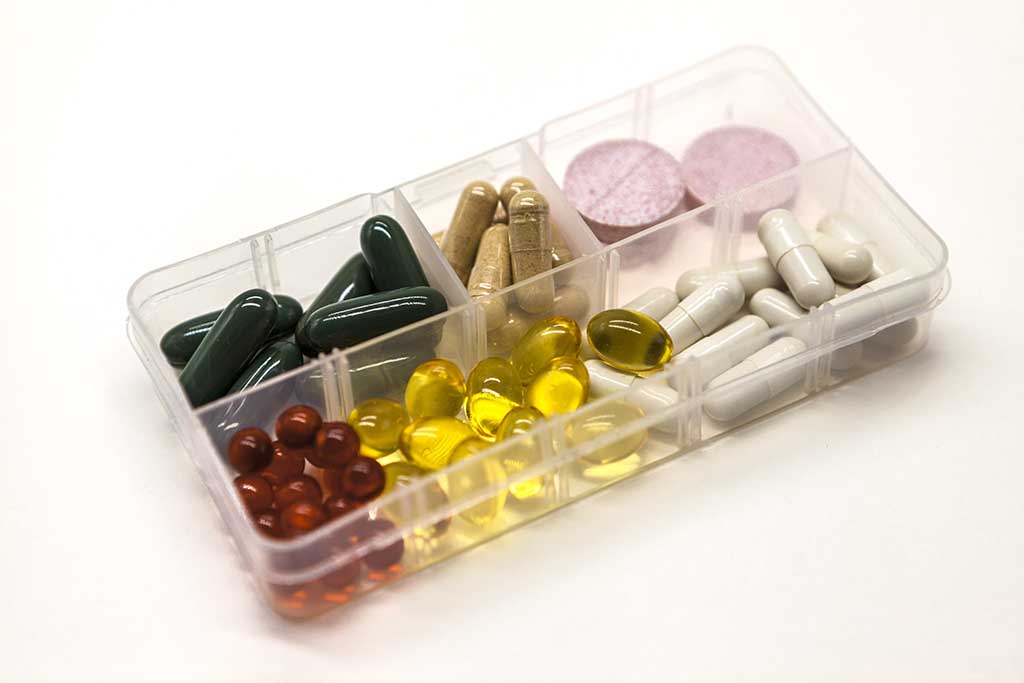

Talk to your Practitioner about your forthcoming trip. They will review your medication and may even suggest some additional supplements to support you. Before I flew to Thailand, I saw my Naturopath and we added in some extra herbs to help prevent potential food poisoning.
Choose where you will carry your medication. I put it in my hand luggage. That way, if my main bag is delayed, I still have my medication with me. Get a small cooler bag for any medication that needs to be kept refrigerated.
Ensure you have enough for the duration of your trip. You don't want to run out in a foreign country, where you might find it hard to get replacements.
During the flight, you may want to take some supplements to help with any symptom you experience. Dr Allison Siebecker has a handout with a range of supplements for each type of symptom . Some common supplements to pack include:



































Activated charcoal



































Iberogast



































Gas X



































Peppermint oil



































Magnesium



































IBGuard



































Electrolyte replacement or oral rehydration



































Imodium
Changing time zones? Get ready for your new time by getting to bed earlier or staying up later in the days leading up to the flight and before you head home. Timeshifter is a handy app that helps you prepare for your new timezone by giving you tips on when to avoid or get things like sunlight, caffeine, sleep and melatonin.
Most international flights come with in-flight entertainment. However, I have been on a handful of flights where the entertainment system has broken. For this reason, I always have a backup plan. I download Netflix movies and tv shows onto my iPad, which I can watch when I'm offline. I have a couple of books available in my Kindle app on my iPhone and have enough podcasts and audiobooks downloaded that I can listen to them for the full duration of the flight if I need to.
If you're an anxious flyer, why not download a meditation app to your phone, so you can do some meditation while you're flying?
Aeroplanes are notoriously germ-ridden places. Everything from faecal matter to Methicillin-resistant Staphylococcus aureus (MRSA) bacteria has been found hiding in the passenger cabin of planes.
Pack anti-bacterial wipes in your carry-on bag and use them to clean your armrest, tray, seat belt clip, toilet door handle and flush.
I also use the Biocidin Throat Spray during the flight. It helps ward off any germs that are spread if people are coughing and spluttering on the plane.
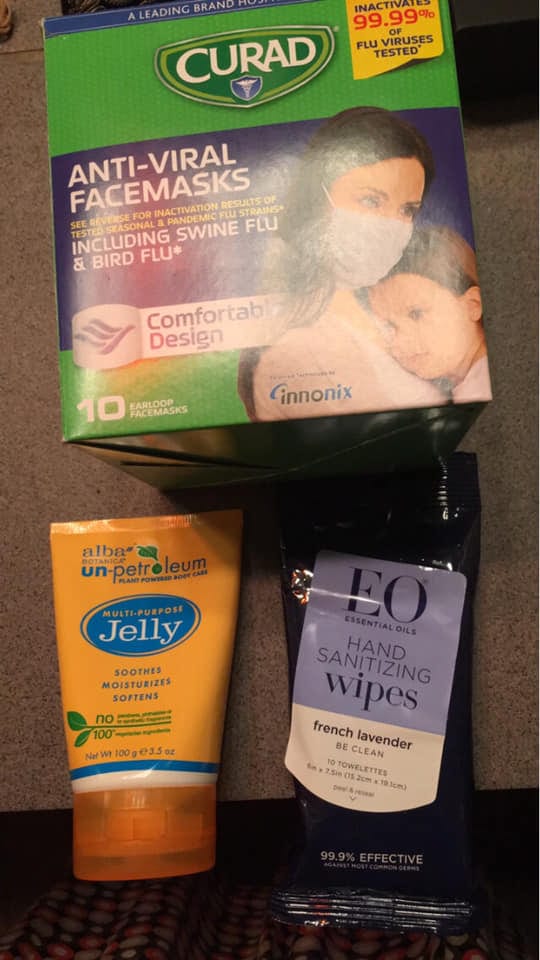

My SIBO Coaching client , Sharon Treadgold packed these items for her recent trip to Australia from the US. The face masks gave her an added sense of security that she wasn't breathing in other peoples' germs.
Whether you plan to be awake or asleep on the flight, bringing a few home comforts with you can help you feel more relaxed. I travel with noise cancelling headphones, my own blanket, a revitalising moisturiser from Ecology Skincare , a neck pillow, eye mask and ear plugs. I also wear flight socks and have a pair of flip flops handy so I can walk into the toilet with shoes on.
Studies have shown that the blankets you receive on the plane are not overly hygienic, as they aren’t regularly cleaned, despite coming in new plastic wrapping. You can only imagine the things people use them for:wiping dirty hands, blowing noses, changing nappies on, or other equally unpleasant activities. It’s not something we want to snuggle up with.
Aeroplane travel is extremely dehydrating. The longer you spend on a plane, the more dehydrated you will become. It is important you are constantly sipping water to keep your body hydrated. Avoid alcohol as this increased the dehydration and can also cause digestive distress.
I take an empty water container through security and then fill it up before I board the flight. I then ask the staff to fill it up with water during the flight.
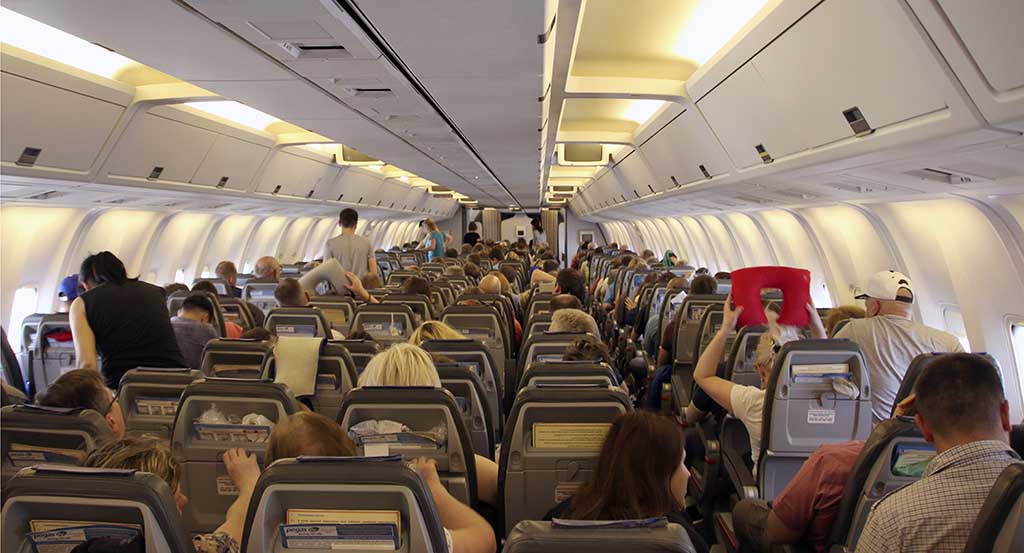

When you are sitting down for many hours at a time, your digestion can slow down and get sluggish. Whenever possible, get up and move your body on the flight. I like to walk up and down the aisles or I will go and stand down the back of the plane and do some simple stretches. If you have a layover, use it as an opportunity to stretch your legs. I walk up and down the terminal, moving constantly until I need to get back on the plane.
On my most recent flight to the US, I departed Melbourne at 11.30am. As soon as I got on the plane, I changed my watch to US Pacific Time and started telling myself that it was 6.30pm. As soon as we had been fed dinner, I told myself it was bedtime and took a melatonin tablet and went to sleep. When I arrived at LAX at 9am, I was relatively refreshed and ready for the day ahead.
The first thing I do when I arrive at my new destination is to go outdoors and get some fresh air and sunlight on my skin. This helps acclimate to my new timezone and environment. Even if I have arrived at a winter destination, I wrap up nice and warm and head out.
If the weather is warm, I like to touch the ground with bare feet. Dave Asprey of Bulletproof fame talks about how earthing helps return the body to a neutral current. I personally find it beneficial and make an effort to touch the ground with bare feet whenever I can.
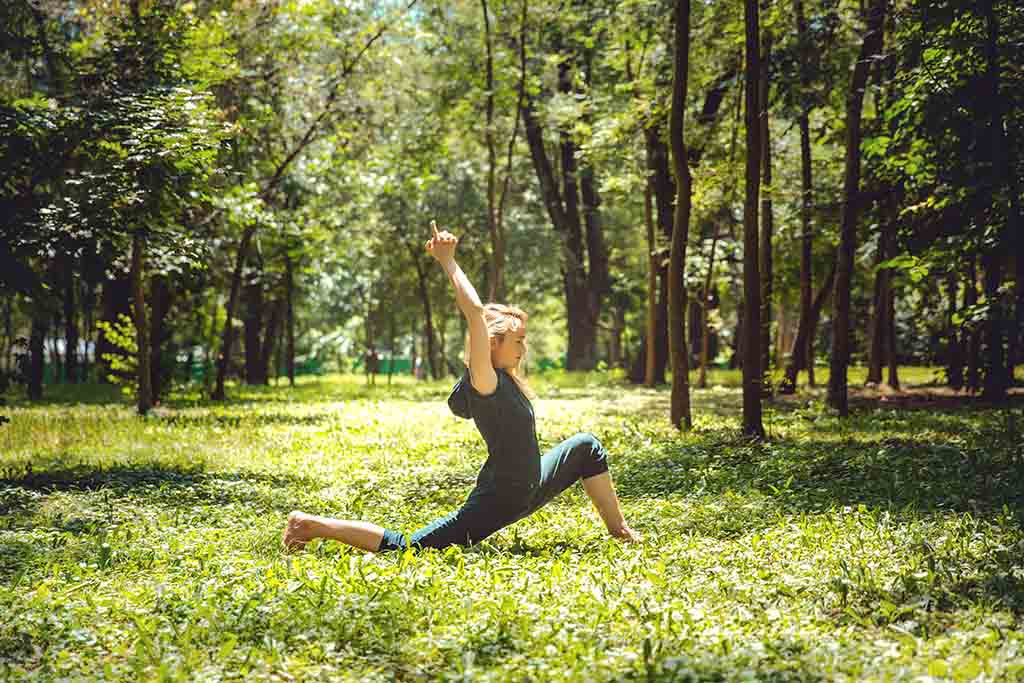

After many hours crammed into a plane, there is nothing better than moving your body. It helps to get fresh oxygen to all parts of your body, and can also help reset your circadian rhythm to your new timezone. I always pack a sturdy pair of walking shoes and hit the pavement of my new location. It's a great way to check out your new neighbourhood while also exercising. Check out a local yoga or pilates class for some structured exercise or do a walking tour.
You might be off the plane, but it doesn't mean your body isn't still recovering from the impact of long-haul travel. Keeping your food simple will help ease the pressure on your gut. I love nothing more than some steamed or grilled fish and steamed veggies when I first arrive. Also keep your meal sizes small to give your gut a chance to process the food. As tempting as it might be, avoid alcohol as this will contribute to your dehydration and can interrupt your sleep cycle.
I always incorporate intermittent fasting into my travel routine. It helps my gut calm down from the pressure of travelling, and I find I sleep better when I haven't eaten a lot.
You might like to ensure you get at least 12 hours break between dinner and breakfast, or if you're like me, you can skip breakfast entirely and just eat lunch and dinner.


Spend the first few days of your new location focusing on hydration. Your body has been put under enormous pressure on the plane, so be kind to it and drink lots of good quality, filtered water.
Doing all of the above will help re-set your circadian rhythm. If you arrive in the morning, stay awake as long as you can, ideally going to bed at your normal bedtime.
If you must take a nap, keep it short so you don't confuse your body and further disrupt your sleep cycle.
If you are still struggling to sleep, you might like to take a sleeping aid. I use Integrative Therapeutics Cortisol Manager to help re-set my cortisol levels. If this isn't enough support, I will also take some melatonin at bedtime. This will normally put me to sleep within 30 minutes of taking it.
If you wake during the night, try to avoid turning on any electrical devices. The blue light emitted from these devices can disrupt your sleep-wake cycle. Instead, try some meditation, deep breathing or relaxation techniques. If that fails, I will lay in bed and read a book until I get sleepy again.
It is estimated that for every 1 hour of timezone change, it can take 1 day to recover. Be kind to yourself during this recalibration to your new time zone. If sleep isn't coming easily, stressing about it will make it worse. You will get into your new timezone eventually.


It is a privilege to travel and see new parts of the world. Yes, SIBO can be frustrating, but you have control over how you think . If you choose to approach travel with fear, it's highly likely your trip will be extremely stressful. Instead, if you approach your trip with interest and intrigue and allow for situations to happen that are outside of your control, you will enjoy your trip much more.
I love the uncertainty of travel. I love meeting new people, tasting new food, learning new languages, smelling new smells, seeing new cities and landscapes, and even when things go wrong, I find a way to laugh about it.
Before you go, brainstorm a wide range of possible scenarios and think about how you will handle those situations. The more prepared you are, the easier they will be to cope with.
Do you have your own fool-proof travel hacks? I would love to hear them. Simply put them in the comments below.
Pin945 Shares Hvad er Gilbert-syndrom?
Gilbert syndrom er en harmløs genetisk tilstand, der forårsager unormal nedbrydning af bilirubin, en forbindelse, der dannes ved hæmoglobin fra rødt blodlegemer nedbrydes. Højt bilirubin kan forårsage
Hvad er Gilbert-syndrom?
Gilbert syndrom er en harmløs genetisk tilstand, der forårsager unormal nedbrydning af bilirubin, en forbindelse, der dannes ved hæmoglobin fra rødt blodlegemer nedbrydes. Højt bilirubin kan forårsage
 Hvad er den bedste diæt for en person med colitis ulcerosa?
Hvad er colitis ulcerosa? Colitis ulcerosa er en kronisk tilstand, hvor din tyktarm og endetarm ofte er betændt. Den bedste diæt for en person med colitis ulcerosa er en, der inkluderer magert prot
Hvad er den bedste diæt for en person med colitis ulcerosa?
Hvad er colitis ulcerosa? Colitis ulcerosa er en kronisk tilstand, hvor din tyktarm og endetarm ofte er betændt. Den bedste diæt for en person med colitis ulcerosa er en, der inkluderer magert prot
 Naturlig lindring til tænderskæren
At slibe og sammenbidte tænder er en af de mest almindelige reaktioner på kronisk stress på lavt niveau – den slags stress, vi alle oplever, når det kommer til at håndtere vores helbred, administrer
Naturlig lindring til tænderskæren
At slibe og sammenbidte tænder er en af de mest almindelige reaktioner på kronisk stress på lavt niveau – den slags stress, vi alle oplever, når det kommer til at håndtere vores helbred, administrer